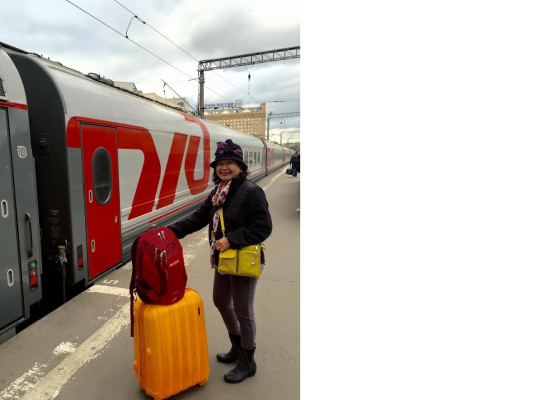
I can tell it’s getting colder where I’m going by the state of the birch forest enclosing the railway corridor. They begin to appear as the train exits the concrete jungle of Moscow, and they are everywhere. They grow in clusters like bamboo, with tall, gangly trunks, whitewashed to a sheen and broken by black excoriations where bamboo nodes might be, and like them, they seem to dance gracefully with the breeze. Their leaves are still green and cover a full canopy. Six hours later, in the autumn’s twilight, the leaves have turned to gold, but they still cling to the branches in precarious fashion. In the breeze they flutter like golden coins reflecting the gleam of the setting sun.
Siberia in Autumn

The train brakes gently to a crawl to its first stop and receives more passengers. There are vendors on the train platform offering besides food, all manner of merchandise; kitsch jewelry, sweat pants, hats, stuffed toys. The summer season is over, the kids have gone back to school, and only the occasional tourist, like me, is on board. I am told, the entire train is nearly empty, even the usually crowded third class coaches. Only three compartments out of nine in my first class carriage are occupied. In one, a couple with a young daughter. In the other a mother and her daughter are going home from visiting relatives in Moscow. They are getting off before the train’s final destination in Yekaterinburg. Thankfully, they speak English and that is a treat on this 26-hour journey of 1816 miles and passing through on one of seven time zones. Though friendly and they help me order my three meals on board and interpret with our carriage hostess, they do not converse freely and respond only to my initiative. I don’t know, is it due to language barrier or is it a Russian characteristic? Perhaps they are more reserved and not accustomed to the easy informality of Americans. Alexei, my Moscow guide, is taciturn, but has no ambivalence on current life in Russia with Putin. He recites without elaboration that Russians approve highly of him and he is very popular among the common people. Putin is going to be another Brezhnev, who provided the people with jobs, housing, free education and medical care. Never mind that Brezhnev presided over the stagnation of the economy and ushered the worst recession. He dismisses Gorbachev and detests perestroika and glasnost, summarily blaming him for the bread lines and Russia’s economic collapse. He dismisses Stalin’s ruthless policies and human rights violations as necessary to build Russia’s power to win the war, “He saved mother Russia from the Germans!”, Alexei pronounces. He notes for me that Moscow has plans to build 200 churches to replace those destroyed during Stalin’s time but he does not see the contradiction in his insistence that the people were free to worship then. I stop. He was born in Moscow 39 years ago, has not traveled abroad, and has not even traveled on the trans Siberian route.
The train is pushing from the station and it’s getting dark. I settle in my compartment and my provodnista, the cabin concierge, prepares my bed for the night. I wobble to the restaurant car, next to mine and eat my dinner of desiccated fried pork and boiled flavorless elbow macaroni garnished with three crunchy cucumber slices. I ask for lemon slices from a picture to improve the flavor, and order beer from a picture to wash the dry meal down. The waitress does not bother to try to understand what I am saying, until I find a way. The service people I encounter are uniformly unhelpful. On the metro they scowl and wave me away and withdraw eye contact. I get around by choosing passers-by and most go out of their way to help me. Not much has changed in this regard from my encounter with petty bureaucrats in 1986. Anyone with any authority at all, no matter how small, acts like a Napoleon.
But a lot has changed.
The USSR is no more. Capitalism is in. Gone are the empty shelves at GUM, the palatial department store next to Red Square. Designer fashion fills its spaces. Gone are the food lines. Imported cheeses, juicy meats abound in well-stocked supermarkets. Sushi is in fast food and fine restaurant menus. Cafe society is thriving, and the bar scene rocks. There are homeless people, there are beggars. There is unemployment. Gone are the giant banner portraits of Lenin flapping on building facades. History is being rewritten, there is movement to bring the new history to schools. Michael Jackson has a statue in Yekaterinburg, rap music is all over. But still the more things change, the more they stay the same. CNN is blocked and real journalists disappear. There are certain industries that masquerade as innocuous businesses whose locations do not get shown in maps. While some rules can be flaunted, like playing loud party music and ignoring police if called, there are lines drawn and people are careful not to cross them; public criticism of Putin, for example.The Russian Orthodox church is gaining ground and no one knows where it will lead. My Yekaterinburg guide, Vadim, has more complex comments than Alexei, reflecting his different position in society. He is an entrepreneur who owns his travel business, has traveled abroad extensively and has a wide network of contacts, and many friends who emigrated to Europe, the US, and the UK. He pays attention to world events and understands politics. His patriotism is derived from the rivalry between Yekaterinburg and Moscow, and his belief that his state is the heart of Russia, and the next leader will come from its ranks. I must not forget to get his contact information and invite him to Atlanta and to make sure he remembers me. He is going places. Perhaps a generous tip will do?